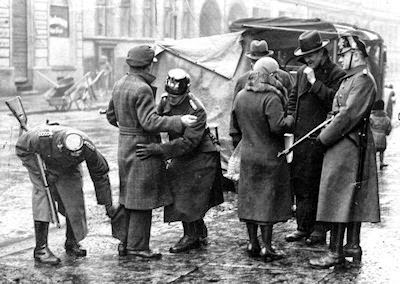Holiday Gestapo Put Your Guns Away- I am going to Celebrate Holy Week....
 |
| "Hold it! I think I found an Easter Liturgy!" |
It's Holy Week! Palm Sunday...Maundy Thursday...Good Friday...Resurrection Sunday. Aren't you excited?
If you are, there is little need to read this post unless you want some cannon fodder. If you are rolling your eyes at me and muttering "Papist" under your breath then by all means continue reading.
I am appalled, stunned, outraged and disgusted with the "Holiday Gestapo" who love to point to the pagan roots of Christmas and Easter, the lack of Biblical grounds and generally tear down these two holidays. And these are Christians who do this!
Generally, there are two objections, the pagan elements supposedly just oozing out of them and the hardcore application of the Regulative Principle. Since the Passion Week is more or less free from pagan influence (the name Easter is derived from the name "Ishtar"- a Babylonian goddess. However, most people do not think of Ishtar when they hear 'Easter". They either think of the Easter bunny or of Jesus and we should encourage the latter. However, we are not required to call it "Easter." We can go with the Eastern tradition and call it "Paschal Sunday." ) The Rev. Jeff Meyers has dealt with the issue of supposed Pagan elements in Christmas so I will simply provide a link for that and move on the heart of the issue.
( Jeff Meyers: Is Christmas Christian? )
Now, I believe worship is governed by Scripture but I would not say I believe in the Regulative Principle of Worship. I would prefer the term "Defined Principle of Worship," because Scripture defines rather than regulates. Formerly this was called "Normative," that is we find norms for worship in Scripture in the New Covenant. However, this term has been since hijacked to mean we can do whatever we want in worship provided it is not forbidden. So I prefer "Defined." It's a subtle difference and I might explore it in another post sometime. But since my readers generally hold to the RPW, I'll argue within that framework.
Now, just what is the Regulative Principle of Worship? There are two basic elements:
- We are to worship God as the Bible says and that we ought to have Biblical basis for what we do in worship
- We must not use any element of worship which the Anglicans use unless there is really clear scripture verse demanding we do it.
Okay, so the second principle is not technically part of the Reformed principal of Regulative Worship. However, it is the unspoken addition for many.
So, we must ask the question: Does celebrating Easter violate the Regulative Principle? No, I Say! A Thousand times NO!
Consider! Do we ADD anything to worship at Easter? No! Do we introduce unscriptural elements? No!
What do we do?
We read those passages from the Gospel dealing with the Passion and Resurrection of Christ. Is reading the Bible against the Bible? I should think not! Is reading Matthew 26-28 a grave sin? Goodness gracious me of course not!
What else do we do? Oh- we sing hymns about these events. Is singing hymns forbidden in the Bible? If you think so, I'd check that with Paul before saying anything else...
All in the world we are doing is making the focus of our Bible readings, sermons and singing a certain part of the life of Christ. And since we do it once a year at a certain time- that is no crime! But should we not focus on these things at every worship service? Yes. We should proclaim the Gospel in its fullness every Lord's Day. But we don't sing hymns about the Ressurection (exclusively) every Lord's Day. We do not always preach from Matthew 27-28 or from John 20 every Lord's Day. The Liturgical Calender is simply a thematic ordering of scripture reading and preaching. It's no different than centering the service on Salvation by Grace through faith when preaching Romans 8 or Ephesians 2.
I think it's also worth pointing out that in John 10:22, Jesus is in Jerusalem for Hanukkah, a feast day not commanded in Scripture or anywhere mentioned until this verse. It's also worth noting that when the Jews add Purim to the feast calendar, we have no word of condemnation. This is because in Scripture it is the norm for God's people to commemorate these events annually because God Himself establishes the principle at Passover. It's only natural that we celebrate and remember this time each year that great New Exodus event.
Now, there some extra elements often brought into the worship service during this week (Passion Week). Let's quickly examine them:
Palm Sunday Processional: In case you are unfamiliar with this tradition, this is when the children of the congregation carry palm branches down the isle as a way to commemorate the way the crowds scattered branches before Christ at the Triumphal Entry. Oh well surely that is without Scriptural warrant! But if we grant that processions are a Biblical practice (and they are, just look at worship in the old covenant), then it's a matter of theme again.
Easter/ Christmas Plays: Okay, I'm not going to defend these per se. If a Church wants to do a play it should not replace the Worship service with it. If they want to do a Saturday evening or afternoon performance fine. But the Bible doesn't give sanction to the use of plays for worship.
Special Services: These are not against Scripture for I ask is it wrong to gather with the Brethren during the week? No, and so long as we do not add any unscriptural worship element I don't see the problem.
I hope I've done a little to drive away the condemning cloud of the hardcore RPW folks so that won't rain on your Palm Sunday processional or your Easter parade.
Happy Eoly Week!



Comments
Post a Comment